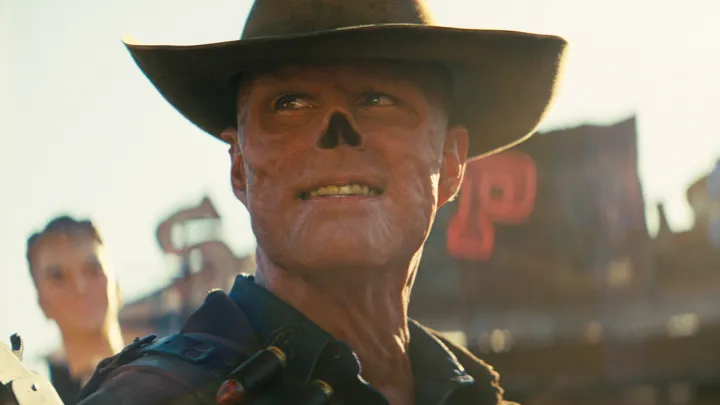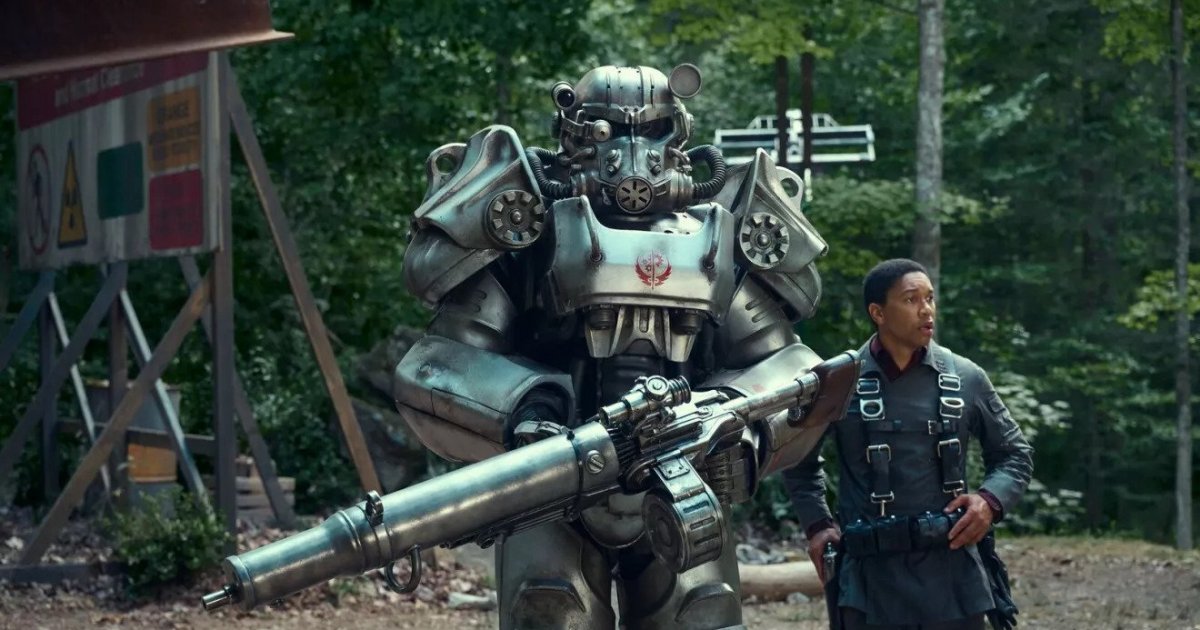When the first trailer for Amazon’s Fallout dropped, the internet was hit by a familiar wave of eye rolls. Every aspect of it was scrutinized, from its Power Suit design to its title card gags. Now, days after the entire series was released on Amazon Prime Video to rave reviews, those preemptive haters are eating irradiated crow.
The skepticism wasn’t entirely unwarranted, and not just because the first trailer didn’t paint a full picture of just how damn funny the series is. The term “video game adaptation” still has some red flags attached to it. The term still brings to mind schlocky blockbusters like Doom and Prince of Persia. That perception is turning, though. HBO’s The Last of Us proved that a video game could translate into Emmy-nominated prestige television. Fallout is likely to follow in that show’s footsteps, doing for comedy what The Last of Us did for drama.
Fallout’s success may be the more impressive feat, though. While The Last of Us was born from developer Naughty Dog’s cinematic instincts, the Fallout games aren’t ones that can translate as neatly to TV. They’re sprawling RPGs where players get to forge their own path in the wasteland while juggling tons of storylines at once. It shouldn’t work outside the confines of a video game, but it does. That’s thanks to a bold decision that future filmmakers should take notes of: It adapts the world of Fallout, not its story.
Selective adaptation
While the story doesn’t directly adapt the quests of Fallout 4 or Fallout: New Vegas, the puzzle pieces are all there. Lucy acts as a stand-in for the usual player character, as Fallout games generally cast players as a vault dweller experiencing the outside world. Factions like the Brotherhood of Steel, Raiders, and The Enclave all play a significant role. Lucy comes face-to-face with Radroaches and Gulpers. And of course, the series gets a lot of use out of the games’ iconic Pip-Boy.

Sometimes going in that direction can be frustrating in video game adaptations. There are plenty of movies that pay hollow lip service to their source material, but fail to capture anything else about their essence (see Doom with its laughable first-person sequence). Fallout doesn’t have that problem. Instead, you get the sense that the show’s creators are playing in the RPG sandbox just as each new game does. It at times feels like a series of Wasteland vignettes, with the creators having fun exploring the power dynamics between factions and Lucy’s “fish out of water” comedy.
Here, that approach feels like a revelation that few, if any, video game adaptations have nailed. It captures the spirit of the games, but smartly works around the interactive elements that often get lost in translation. For instance, a big draw of Fallout games is that they are RPGs that let players shape their character as they see fit. In Fallout 3, players are quickly presented with a moral choice when they find an undetonated bomb at the center of a town called Megaton. Kind players can leave Megaton alone, letting it stand as a helpful hub. Those choosing to role-play as a jerk, on the other hand, can choose to blow the entire town up. That action has serious consequences later in the game, letting players create their own adventure.
That’s not something you can reproduce in a TV show due to a lack of interaction, but the Amazon series has a smart solution. It follows three main characters, each of which represents a different type of player character. Lucy is the kind of goody two-shoes that a player would end up inhabiting if they always chose the nicest answers. The Ghoul is the polar opposite: a shoot first, ask questions later renegade. And Maximus gets to fill the role of a lovable buffoon, a stand-in for someone goofing off in a Bethesda game. Through that structure, the show is able to communicate the hook of the RPG in the context of a static story.

Never stop playing
It helps that the show is working with such distinct source material too. Amazon’s Fallout retains the exact same humor as Bethesda’s games. The local eccentrics Lucy meets throughout the world have the exact energy as the game’s weirdo NPCs. It doesn’t just dish out cheap fan service either; it’s invested in adding to that lore. The fact that the show gives a backstory to the series’ thumbs-up-giving mascot speaks to how committed the creators are to bringing something additive to the universe, rather than filming what was already there.
If you’re still skeptical about Fallout, I can’t blame you. The current wave of hype around it almost feels too far in the other direction at present. It’s certainly not something you’d classify as “prestige TV,” playing more like a tamer attempt to capitalize on Amazon’s The Boys. It’s silly, hyperviolent, and meandering at times as characters walk through the wasteland to their next objective, like a game character traveling to a quest marker.
Even with those critiques, Fallout should be celebrated for what it accomplishes just as much as The Last of Us was at release. It’s a thoughtful way to adapt a genre that doesn’t easily lend itself to other media formats. A success like this should be a blueprint going forward, reminding creators to never stop playing with the games they’re adapting.
Fallout is available to stream now on Amazon Prime Video.
Editors’ Recommendations

